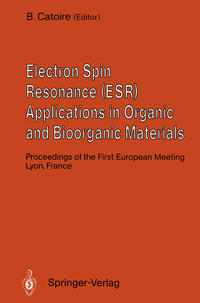
E.S.R. techniques which are mature from a fundamental point of view. now constitute a routine investigation tool in chemistry as well as in biophysics in order to study and to follow the behaviour of radical species. Among the practical applications. let us mention for instance : -diffusion phenomena (solid -solid. liquid -solid such as the diffusion of molecules through membranes. films fibers ... ). -study of radical species to improve the elaboration of materials with high added value (composites). -detection of ionised food. -liquid crystals. polymers. -radiochemistry. -targetting of drugs. toxicology. A better understanding of basic phenomena allows to optimize industrial products and processes applied as well as in advanced fields as in well established ones. The high sensivity of ESR Spectroscopy and its derived specific techniques (spin labelling. spin probe. spin trapping ... ) offer information on the fme morphological structure of the matter as well as on its behaviour under various treatments otherwise not available. A Symposium was organized in Lyon (France) in January 1990 to promote the use of ESR. Its originality was to deal with the practical applications of ESR to organic and bioorganic materials. The scope of this meeting was to enlarge the field of application from basic research to more applied subjects and this may concern industrial as well as academic researchers. Moreover. the purpose of this symposium was to promote exchanges between European specialists working in public or private areas.